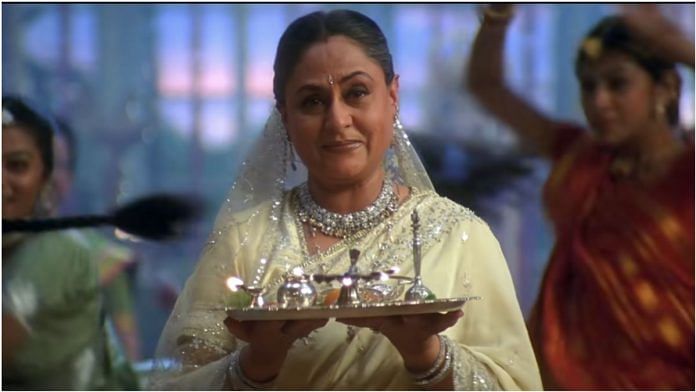Bollywood’s most iconic Diwali celebration has to be in Karan Johar’s Kabhi Khushi Kabhie Gham. The return of the prodigal son and a mother’s intuition marks the Raichand’s Diwali festivities. But the 2001 movie was also the last one where a key plot point centred on the festival of lights.
Before K3G, Sanjay Dutt’s Vaastav: The Reality (1999) also featured a Diwali homecoming. Here it’s the dreaded gangster Raghu (Sanjay Dutt) who emerges from his forced hideout to spend Diwali with his family.
Beyond family reunions, Diwali has also been seen as a socially sanctioned moment for desi couples to flirt. In the cult classic, Hum Aapke Hain Koun…! (1994) one of the 14 songs is dedicated to the family’s Diwali celebration. It’s during this song that Nisha (Madhuri Dixit Nene) and Prem’s (Salman Khan) love blooms.
In Aditya Chopra’s Mohabbatein (2000), Diwali is a moment of teen rebellion. Vikram (Uday Chopra), Sameer (Jugal Hansraj) and Karan (Jiimmy Shergill) ask their respective love interests to meet them, as an affirmation of their love. Shah Rukh Khan as their music professor Raj Aryan, encourages the three teens to dance along with their love interests Ishita (Shamita Shetty), Sanjana (Kim Sharma) and Kiran (Preeti Jhanghiani) to Pairon Mein Bandhan Hai. It becomes the song of resistance to the overbearing authority of Narayan Shankar (Amitabh Bachchan), and also of love beyond any kind of societal restrictions.
But after the turn of the century, the festival seems to have disappeared from the big screen. Holi and Karwa Chauth have taken over. It is almost as if Diwali is too clean and bland. There are no controversies around it, except firecrackers and pollution.
Also Read: Enough with Diwali sensory overload—introverts like me want food, films, fairy lights
Consent and love
Holi has been Bollywood’s favourite festival. The wide variety of songs dedicated to it is proof — from Rang Barse in Silsila (1981) to Balam Pichkari in Yeh Jawaani Hai Deewani (2013) and the title track of Badri Ki Dulhania (2017). And what is being celebrated isn’t new beginnings, but harassment of women. The lyrics are almost always suggestive, it’s about touching people using the excuse of applying colour. Consent is absent from Holi celebrations, and it’s glorified as love.
Bollywood’s sanction of such unfettered creepiness is immortalised in the phrase Bura Na Mano Holi Hai—don’t be offended, it’s Holi.
On the other hand, there is Karwa Chauth—a festival with what is plugged as devotional love at the centre of it. The festival is as traditional as it gets, the fasting wife or girlfriend waiting for her often errant husband to return to her, be it in Biwi No 1 (1999), Ishq Vishk (2003), K3G or the ever-iconic Dilwale Dulhaniya Le Jaayenge (1995). Bollywood has shaped the festival—the way it’s celebrated on screen has become the only way to do it.
The trend is now aided by social media pictures of Bollywood couples sharing pictures of their first Karwa Chauth.
Diwali has been in exile long enough, it’s high time the festival gets to come back home to the big screen.
Views are personal.
(Edited by Theres Sudeep)



